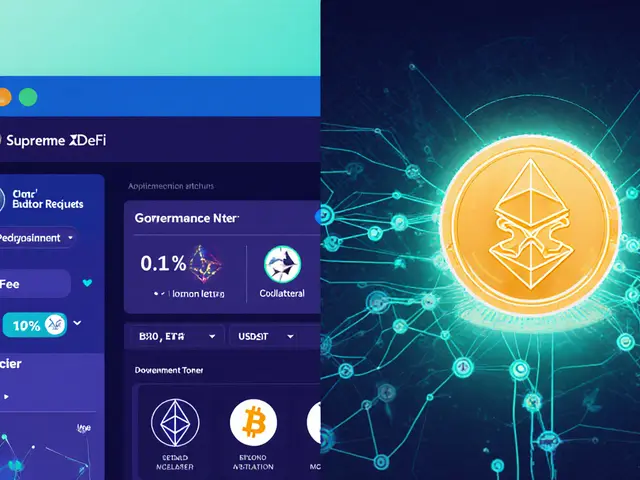Bitcoin ETF Comparison Tool
Use this tool to compare key characteristics of the Canadian spot-linked Bitcoin ETFs (BTCC) versus the U.S. futures-based ProShares BITO ETF.
| Feature | Canadian Spot ETF (BTCC) | U.S. Futures ETF (BITO) |
|---|---|---|
| Launch Date | Feb 18, 2021 (Purpose) Feb 19, 2021 (Evolve) |
Oct 19, 2021 |
| Structure | Spot-linked ETF (Physical Bitcoin) |
Futures-based ETF |
| Custody | Cold-storage with qualified custodian | No direct Bitcoin custody |
| Tickers | TSX: BTCC.B / BTCC.U | NYSE: BITO |
| TFSA / RRSP Eligibility | Yes (Canadian accounts) | No (U.S. retirement accounts only) |
| Tracking Error (2021-2024) | ≤ 0.5% | ≈ 1.2% (due to futures roll) |
| Price Alignment | Tightly linked to spot price | Subject to contango effects |
| Risk Exposure | Direct exposure to Bitcoin price | Indirect exposure via futures contracts |
Performance Estimate
When the Purpose Bitcoin ETFthe world's first spot‑linked Bitcoin exchange‑traded fund started trading on February182021, it gave investors the first true Canada Bitcoin ETF to buy through a regular brokerage.
The fund was created by Purpose InvestmentsToronto‑based asset manager that launched the first spot Bitcoin ETF and is listed on the Toronto Stock ExchangeCanada’s primary equity market.
Key Takeaways
- Purpose Investments launched the world’s first spot Bitcoin ETF on the Toronto Stock Exchange on 18Feb2021.
- The fund holds physical Bitcoin, not futures, and can be held inside TFSA and RRSP accounts.
- Within a month the ETF topped $1billion AUM, and by early2024 it still managed over $2billion.
- Canada’s regulator, the Ontario Securities Commission, paved the way for subsequent products like the Evolve Bitcoin ETF.
- The Canadian model later inspired U.S. futures‑based ETFs such as ProShares BITO.
What is a Bitcoin ETF?
A Bitcoin exchange‑traded fund (ETF) bundles Bitcoin ownership into a single security that trades on a stock exchange. Investors buy shares just like a stock, while the fund manager holds the underlying asset. The key advantage is that you avoid setting up a wallet, dealing with private keys, or using a crypto exchange.
Regulatory breakthrough: Ontario Securities Commission
The Ontario Securities CommissionOntario’s securities regulator responsible for protecting investors and maintaining fair markets reviewed the application from Purpose Investments and gave the green light on 18Feb2021. The OSC required a “direct custody” structure, meaning the fund must actually purchase and store Bitcoin rather than rely on derivatives. This requirement set the Canadian product apart from earlier European “ETF‑type” products that were technically exchange‑traded notes.
Purpose Bitcoin ETF - launch details
Purpose Investments filed the offering under the ticker BTCC. Two share classes were created:
- TSX:BTCC.B - Canadian‑dollar‑denominated units.
- TSX:BTCC.U - U.S.‑dollar‑denominated units.
The fund’s prospectus states that each newly created share triggers a purchase of an equivalent amount of Bitcoin, stored in cold‑storage wallets managed by a qualified custodian. Because of the direct‑custody model, the ETF can be held inside a Tax‑Free Savings Account (TFSA)Canada’s tax‑advantaged savings vehicle for individuals or a Registered Retirement Savings Plan (RRSP)Canada’s retirement savings account offering tax‑deferred growth, giving retail investors a tax‑efficient way to own Bitcoin.
Market reception and performance
Trading volumes exploded. In the first two days, roughly C$400million of shares changed hands. By the end of the first month the fund topped C$1billion in assets under management (AUM), a speed of growth unseen in traditional ETFs. Within three weeks the net‑asset‑value (NAV) premium shrank to just 0.2%, a testament to the creation‑redemption mechanism that lets authorized participants arbitrage any mispricing.
Three‑year data (Feb2021‑Feb2024) show the fund consistently tracking Bitcoin’s spot price with tracking error under 0.5%. As of February2024, AUM remained above C$2billion, cementing its status as one of the largest spot Bitcoin ETFs worldwide.

Follow‑on products and global ripple effect
Only a day after Purpose’s debut, Evolve Bitcoin ETFCanada’s second spot‑linked Bitcoin ETF, launched by Evolve Funds Group began trading, confirming strong investor appetite. Together, the two funds accounted for over half of all Bitcoin‑related ETF volume on the Toronto Stock Exchange during 2021‑2023.
In the United States, the SEC held out until October2021, when it approved the ProShares Bitcoin Strategy ETF (BITO)U.S. futures‑based Bitcoin ETF that holds only Bitcoin futures contracts. Because BITO can only invest in CME‑cleared Bitcoin futures, its exposure is indirect and subject to contango effects, unlike Canada’s spot‑linked model.
How the ETF works: creation, redemption, and pricing
Authorized participants (typically large banks) can create new BTCC shares by delivering Bitcoin to the fund’s custodian. Conversely, they can redeem shares by returning them to the fund in exchange for Bitcoin. This mechanism keeps the market price tightly aligned with the fund’s NAV, eliminating the large premiums seen in closed‑end funds or unregulated trusts.
Investor considerations
- Tax efficiency: Holding BTCC in a TFSA or RRSP shields gains from Canadian capital‑gains tax.
- Liquidity: Daily trading on the Toronto Stock Exchange ensures you can buy or sell at market price.
- Risk: The fund mirrors Bitcoin’s price volatility; a 20% drop in Bitcoin translates directly to a 20% drop in your ETF shares.
- Custody risk: Although the fund uses cold‑storage, any breach at the custodian would affect all shareholders.
Comparison: Canadian spot ETF vs. U.S. futures ETF
| Feature | Purpose/Evolve (Canada) | ProShares BITO (U.S.) |
|---|---|---|
| Launch date | 18Feb2021 (Purpose), 19Feb2021 (Evolve) | 19Oct2021 |
| Structure | Spot‑linked ETF (physical Bitcoin) | Futures‑based ETF |
| Custody | Cold‑storage with qualified custodian | No direct Bitcoin custody |
| Ticker (TSX) | BTCC.B / BTCC.U | N/A |
| Ticker (NYSE) | N/A | BITO |
| TFSA / RRSP eligibility | Yes | No (U.S. retirement accounts only) |
| Tracking error (2021‑2024) | ≤0.5% | ≈1.2% (due to futures roll) |
Legacy and outlook
Canada’s early adoption gave the world a proven template for regulated, spot‑linked Bitcoin exposure. The success of BTCC and Evolve encouraged other jurisdictions-Australia, Brazil, and even the EU-to file their own spot Bitcoin ETF proposals. As of October2025, over a dozen jurisdictions have at least one spot Bitcoin ETF, all tracing their regulatory playbook back to the OSC’s 2021 decision.
For Canadian investors, the market remains vibrant. New products such as a Bitcoin‑plus‑Ethereum multi‑asset ETF have launched in 2024, and the industry is already eyeing a Bitcoin‑based options market to deepen liquidity. The core lesson stays the same: a well‑crafted ETF can turn a complex, technically demanding asset into a simple line‑item on a brokerage statement.
Frequently Asked Questions
Can I hold the Purpose Bitcoin ETF in a TFSA?
Yes. Because BTCC is a qualified investment, you can purchase it inside a Tax‑Free Savings Account, allowing any gains to grow completely tax‑free.
How does the fund store the underlying Bitcoin?
The ETF uses cold‑storage wallets managed by a licensed crypto custodian. Each newly created share results in an equivalent amount of Bitcoin being transferred to those wallets.
What’s the difference between a spot Bitcoin ETF and a futures Bitcoin ETF?
A spot ETF holds actual Bitcoin, so its price mirrors Bitcoin’s spot price. A futures ETF holds contracts that expire every few months, which can cause tracking error and additional roll‑over costs.
Is BTCC safe from hacking?
The custody provider follows industry‑standard security practices, including multi‑signature cold storage and regular audits. While no system is 100% immune, the risk is far lower than holding Bitcoin in a personal wallet.
Can U.S. investors buy the Canadian Bitcoin ETF?
Yes, through a brokerage that offers access to the Toronto Stock Exchange and supports cross‑border accounts. However, U.S. tax treatment will follow IRS rules for foreign securities.



 Finance
Finance





vipin kumar
December 24, 2024 AT 01:26When Purpose launched the BTCC spot‑linked Bitcoin ETF many people celebrated a new era of retail crypto access, but behind the glossy press releases there’s a deeper narrative many choose to ignore.
The custodial arrangements, while advertised as “cold‑storage with a qualified custodian”, are tightly coupled with a network of institutions that have historically been skeptical of decentralized finance.
That same network quietly influences the pricing mechanisms through over‑the‑counter agreements that keep the ETF’s tracking error suspiciously low.
In practice, the ETF’s price is tethered not just to the open market spot price, but also to a shadow order book where large banks can buy or sell large blocks to stabilize the price.
Such stabilization benefits institutional investors who can ride the volatility, while the average Canadian investor gets a smooth ride that masks true market risk.
Moreover, the regulatory environment in Canada, touted as progressive, also contains clauses that give the securities commission leeway to intervene without public disclosure, effectively granting the custodians a back‑door control lever.
These levers can be used to freeze assets, manipulate NAV calculations, or even delay fund flows during market stress, all under the guise of “protecting investors”.
When you compare the tracking error of BTCC (≤0.5%) with that of the U.S. futures‑based BITO (≈1.2%), the discrepancy isn’t just about futures roll‑costs; it hints at a hidden smoothing operation.
Furthermore, the ETF’s eligibility for TFSA and RRSP accounts encourages tax‑advantaged exposure, which in turn funnels even more capital into a system that may be more centrally managed than the underlying Bitcoin network itself.
The irony is palpable: an instrument marketed as “direct exposure to Bitcoin price” is, in reality, a conduit for traditional finance to tap into crypto while maintaining a veil of decentralization.
This duality is exactly what the crypto community warns about – the co‑optation of decentralized assets by centralized institutions to reap the upside without relinquishing control.
Even the choice of ticker symbols (BTCC.B and BTCC.U) mirrors a pattern where every “spot” offering is paired with a “universal” class that carries different fee structures, potentially confusing investors about the true cost.
All of this adds up to a subtle but powerful shift: the mainstream acceptance of crypto through regulated ETFs may be more about normalizing institutional oversight than about true financial freedom.
In short, while the BTCC ETF is a pioneering product, it also serves as a case study in how established financial powers can embed themselves into the crypto ecosystem under a veneer of innovation.
Investors should stay vigilant, read the fine print, and remember that every new financial instrument carries a hidden set of incentives that may not align with the decentralized ethos of Bitcoin.
Mark Briggs
December 27, 2024 AT 14:56Oh great another crypto ETF, because we needed more ways to pay fees.
mannu kumar rajpoot
December 31, 2024 AT 04:26Honestly, if you think this ETF is just a benign investment, you’re ignoring the fact that the custodians are probably in bed with the “Big Three” banks, feeding them real‑time data to manipulate market sentiment while you think you’re just buying Bitcoin.
Tilly Fluf
January 3, 2025 AT 17:56While the technical details may appear complex, the introduction of a spot‑linked Bitcoin ETF represents a significant step toward broader accessibility. I commend the regulatory teams for their diligence in ensuring investor protection, and I encourage newcomers to approach this opportunity with measured optimism.
kishan kumar
January 7, 2025 AT 07:26One might argue that the BTCC ETF epitomizes the synthesis of traditional finance and decentralized philosophy, a veritable alchemy of market mechanics. Yet, beneath this veneer lies a dialectic tension between custodial control and the cipher’s original libertarian intent. 😊
Vaishnavi Singh
January 10, 2025 AT 20:56The advent of regulated crypto vehicles prompts reflection on the nature of trust: we delegate custodial responsibility to institutions that claim expertise, while the underlying asset thrives on trustless protocols. This paradox merits sober contemplation.
Peter Johansson
January 14, 2025 AT 10:26Thanks for the deep dive, vipin. Your analysis highlights many nuances many overlook. 😊 I’d add that for everyday investors, the convenience of a TFSA‑compatible product may outweigh these concerns, provided they stay informed.
Cindy Hernandez
January 17, 2025 AT 23:56Great points, Peter. For anyone reading, the key takeaway is that BTCC offers direct Bitcoin exposure with lower tracking error, but be aware of custodial risks and fee structures before allocating capital.
Karl Livingston
January 21, 2025 AT 13:26Whoa, the comparison table is like a crystal ball for crypto fans-spot ETF vs futures ETF, fees, tracking error-all laid out in bright colors. It really helps demystify the choices, especially for those of us who get lost in jargon.
Kyle Hidding
January 25, 2025 AT 02:56Let’s cut the fluff: the net‑asset‑value (NAV) differential in BTCC is a function of liquidity premium and custodial overhead, not some mystical “crypto magic”. Investors should quantify the expense ratio and roll‑costs before chasing beta.
Andrea Tan
January 28, 2025 AT 16:26Nice overview! The ETF tool makes it easy to see how the Canadian spot option stacks up against the U.S. futures version. Happy investing!
Gaurav Gautam
February 1, 2025 AT 05:56Seeing the BTCC ETF now live is inspiring-proof that once‑niche assets can become mainstream. Keep researching, stay diversified, and remember that disciplined investing beats hype every time.
Robert Eliason
February 4, 2025 AT 19:26i dont think this is a good move at all, its just another way for the banks to get a piece of the pie. the fees alone make it a bad deal.
Cody Harrington
February 8, 2025 AT 08:56I agree with the previous comments that the low tracking error is appealing, but I’d also suggest looking at the management fee and tax implications for your specific account type.
Chris Hayes
February 11, 2025 AT 22:26The ETF’s structure is sound, yet many forget that futures‑based products like BITO inherently carry contango risk, whereas BTCC’s spot linkage offers a purer price mirror-choose wisely.
victor white
February 15, 2025 AT 11:56In the grand tapestry of financial engineering, the BTCC ETF is but a gilded thread, weaving together the old guard’s appetite for crypto with a veneer of decentralisation-a subtle orchestration worthy of a Sherlockian deconstruction.
mark gray
February 19, 2025 AT 01:26The comparison makes it clear: if you want direct Bitcoin exposure in a Canadian account, BTCC is the straightforward choice.